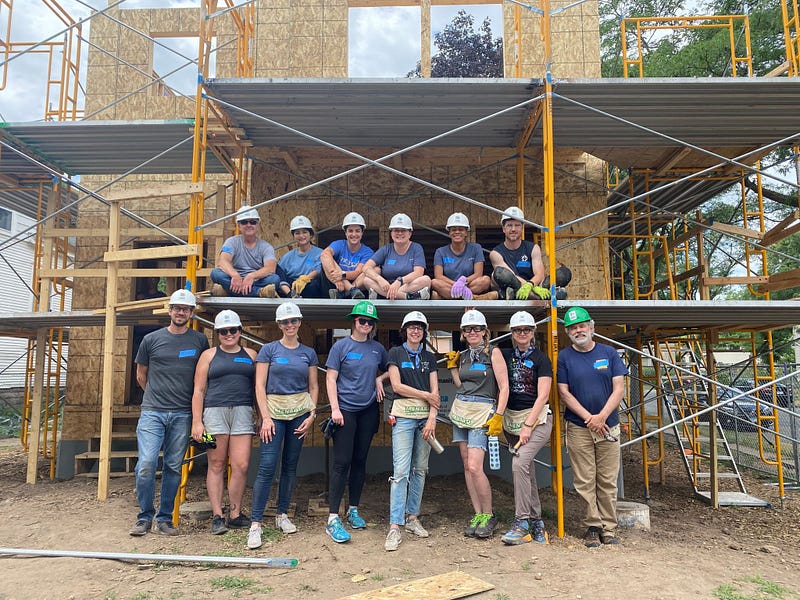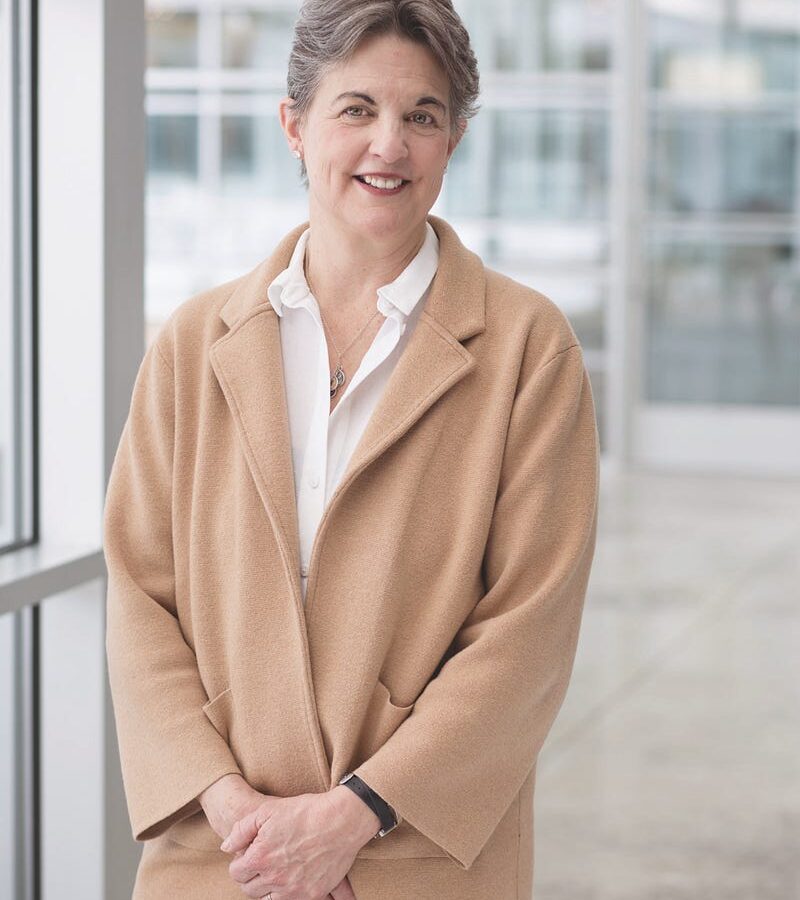Pressure is on companies to demonstrate progress, stability and hope in an unsettled world.
When it comes to designing the future of work, one size fits none. Discovering success isn’t about a hybrid model or offering remote work options. Individuals and organizations are looking for more freedom. The freedom to choose the work model that makes the most sense. The freedom to choose their own values. And the freedom to pursue what matters most. We reached out to successful leaders and thought leaders across all industries to glean their insights and predictions about how to create a future that works.
As a part of our interview series called “How Employers and Employees are Reworking Work Together,” we had the pleasure to interview Nancy Greatrix, Chief People Officer at Room & Board.
Since 1992, Nancy has led Human Resources for Room & Board, an omni-channel retailer of modern home furnishings that is expected to achieve annual sales in excess of $600 million this year. Nancy provides expertise and innovative leadership in business strategy, culture-based leadership development, performance management, wellness, and staff member engagement. Her efforts are laser-focused on preserving Room & Board’s core philosophies and business culture while stimulating growth.
Thank you for making time to visit with us about the topic of our time. Our readers would like to get to know you a bit better. Can you please tell us about one or two life experiences that most shaped who you are today.
I was 20 years old and working as a receptionist at the food service office for the University of Buffalo. I arrived at work one morning and my manager Josephine told me that I was fired. Shocked, I inquired why. She informed me that she had decided my role was now set aside for a student employee, and, unless I choose to go back to college, (I had my A.A.S. degree at the time), she refused to continue my employment. She also informed me that registration for the fall semester ‘happened’ to begin that day. I quickly enrolled in school again and received my B.S. and MBA, all while continuing to work for Josephine. She taught me firsthand to look for potential in others that they may not see themselves and that I also have a responsibility to look out for the best interest of others. What a gift!
Growing up, both of my parents worked full time. My dad had a progressive career at a bank for over 35 years, and my mom owned her own real estate firm. At that time, I did not have a single friend whose mom worked outside the home. They set a tremendous example that meaningful work enhances life.
Let’s zoom out. What do you predict will be the same about work, the workforce and the workplace 10–15 years from now? What do you predict will be different?
What is the same about work?
Really, not much beyond the basics around labor laws etc. Needless to say, we are going through a significant shift, not unlike the workforce transition from agriculture to the industrial revolution and then to the information age.
As it is today, the labor market will continue to shrink with a decrease in both population growth and a decline of those actively engaged in work.
Individuals will strongly believe that beyond the obvious economics of coming to work, work should have meaning and purpose.
Not only will individuals seek purpose in their work, but they will expect their employers to be purposeful and actively seek to make the world a better place.
Our world will continue to be turbulent. Staff members will seek employers who find ways to collaborate, make decisions for the common good and demonstrate that diversity, equity and inclusion are all non-negotiable.
Today, most employers make space for the highs and lows of life (significant life events, family emergencies, health issues, new family members). In the future, staff members will expect ample space for everyday life to be in balance with the expectations of work.
Pay transparency will be the norm.
Workspaces will be more communal. I often make the association between college life and the office of the future. It will be a lot more like a campus Student Union where people come to connect, collaborate and relax.
I think that people will have multiple professional careers either one after another or even two at the same time. It will be interesting to see how employers celebrate that fact and develop staff for a future that may not be at their current organization.
What advice would you offer to employers who want to future-proof their organizations?
It will be critical to invest in HR teams in addition to people strategies. There are many tangible ROIs to these investments — reduced health care expenses, safety/worker’s compensation claims, and turnover. However, equal weight should be placed on the intangibles as well; successful future organizations will intrinsically understand the immeasurable value of doing the right thing. A savvy brand strategy will also be essential to future success.
Strong and meaningful people leadership will also be invaluable to directly exemplify and support those tangible and intangible investments.
Lastly, I would say organizations that give back to the communities in which they live and work, as well as to the greater good of our planet, will thrive.
What do you predict will be the biggest gaps between what employers are willing to offer and what employees expect as we move forward? And what strategies would you offer about how to reconcile those gaps?
Gap 1 — Pay equity
Solution: Reconciliation — less emphasis on profits and more emphasis on economic stability for all.
Gap 2 — Staff development
Solution: Reconciliation — the goal should be to encourage personal and professional development and to celebrate success, even if it is achieved with a different organization.
Gap 3 — flexibility and freedom
Solution: Reconciliation — more flexible hours with a focus on contribution rather than time worked with fair pay and benefits.
We simultaneously joined a global experiment together last year called “Working From Home.” How will this experience influence the future of work?
The momentum for Working From Home, in terms of being fully remote, will wane — with the exception of roles that require a single-minded focus and little need for collaboration. A hybrid model that offers both life flexibility, as well as time with peers to build relationships and collaborate within an office environment, will be critical. This is something we have seen in our commercial Business Interiors division at Room & Board. Progressive companies are already making investments in both the physical structure of their office space as well as the furnishings within those walls, such as collaborative spaces, casual soft seating, and other real amenities (not superficial perks) that make the workplace inviting. Options such as outdoor seating and comfortable, inviting spaces for casual group activities and conversations will be the norm.
Room & Board is an employer with diverse working environments which include our corporate offices, retail showrooms, and delivery and distribution. Retail and delivery/distribution includes many staff members whose work is by nature defined by being in the work environment. I predict there will be a tremendous effort to see how flexibility can be built into their schedules, as well as increased wages and other benefits to compensate for a less flexible schedule.
We’ve all read the headlines about how the pandemic reshaped the workforce. What societal changes do you foresee as necessary to support a future of work that works for everyone?
Generous paid leave laws for caregiving, significant increases in the minimum wage, and political instability must be considered.
The first Tuesday of November, Election Day, should be a national holiday so everyone’s voice can be heard.
The IRS needs to recognize ongoing emotional wellbeing care as preventative. I would love to see employers offer an annual well visit for emotional wellbeing, just like an annual physical. Everyone has issues (big or small) to discuss and should have the opportunity to build a relationship with a mental health care provider BEFORE they may be in crisis.
What is your greatest source of optimism about the future of work?
My greatest source of optimism is that I choose to be optimistic. And when I do so, that positive energy allows me to be creative and do my best work.
Having children who are in their 20s is also a great source of optimism. Their generation is prepared to make this world a better place.
Lastly, I know that there are many more positive people that embrace the goodness in this world than those who choose to be negative. Good is always more powerful than evil, and love always wins.
Our collective mental health and wellbeing are now considered collateral as we consider the future of work. What innovative strategies do you see employers offering to help improve and optimize their employee’s mental health and wellbeing?
Emotional well-being needs to be prioritized and resources delivered in a relevant and flexible way.
Work life balance and the celebration of lives filled with activity and people that bring joy will be essential.

It seems like there’s a new headline every day. ‘The Great Resignation’. ‘The Great Reconfiguration’. And now the ‘Great Reevaluation’. What are the most important messages leaders need to hear from these headlines? How do company cultures need to evolve?
In the past, great workplace cultures were built with the policies of the lowest common denominator as the standard and simply trying to be better than the rest. Tomorrow’s workplace cultures will be influenced by societal issues, and those companies that can adapt their policies and culture to the external world will be successful employers.
- The labor market will remain tight at least until 2050.
- Pressure is on companies to demonstrate progress, stability and hope in an unsettled world.
- DE&I is a non-negotiable.
- The workforce will demand flexibility and work life balance.
- We have not yet begun to understand the full impact of climate change on our teams.
I keep quotes on my desk and on scraps of paper to stay inspired. What’s your favorite “Life Lesson Quote”? And how has this quote shaped your perspective?
“How wonderful it is that nobody needs wait a single moment before starting to improve the world.” — Anne Frank
“Leadership is not about being in charge, it’s about taking care of those in your charge.” — Simon Sinek
Our readers often like to continue the conversation with our featured interviewees. How can they best connect with you and stay current on what you’re discovering?
I enjoy sharing and networking, and I often guest lecture for local organizations and universities. I can be reached at [email protected]
Thank you for sharing your insights and predictions. We appreciate the gift of your time and wish you continued success and good health.


